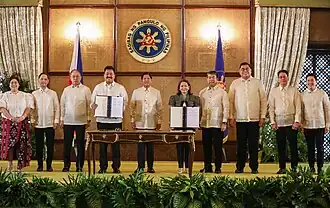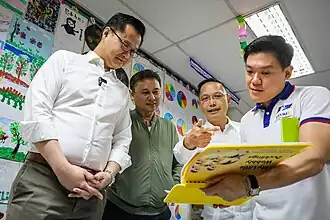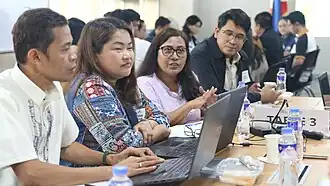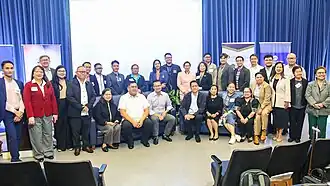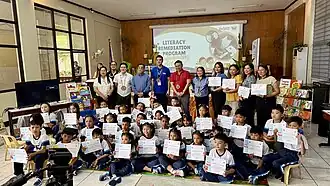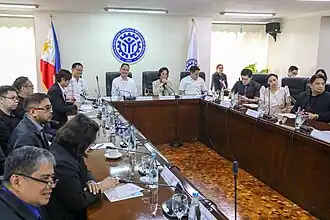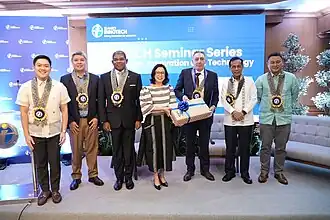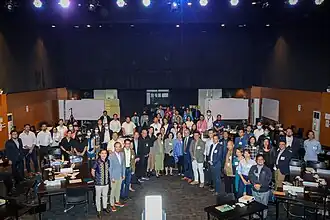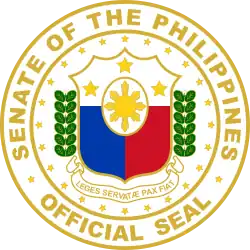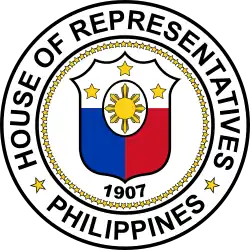Second Congressional Commission on Education
| EDCOM II | |
 The EDCOM 2 Logo | |
| Abbreviation | EDCOM II |
|---|---|
| Predecessor | Education Commission of 1991 |
| Founder | Congress of the Philippines |
| Founded at | Philippines |
| Type | Commission |
| Purpose | Policy research and reforms on the Philippine education system |
| Location | |
Executive Director | Karol Mark Yee, Executive Director |
Key people | Senator Bam Aquino, Senator Alan Peter Cayetano, Representative Roman Romulo, Representative Jude Acidre |
Parent organization | Congress of the Philippines |
| Website | https://www.edcom2.gov.ph/ |
The Second Congressional Commission on Education (EDCOM II) is a Philippine Congressional entity created by the 18th Congress of the Philippines.[1][2]
Overview and History

The body was created by virtue of Republic Act (RA) 11899, which lapsed into law on July 23, 2022.[3]
The Commission is tasked to conduct a national review of the country's education sector after the COVID-19 pandemic exacted a heavy toll on learning.[4] Its primary goal is to recommend legislation and policies to address the "learning crisis" and improve the quality of education in the Philippines.[5]
The Education Commission of 1991
The first Education Commission was established in 1991.[6] It was tasked with assessing the state of Philippine education and recommending reforms. The commission's findings highlighted issues like low investment, disparities in access, low achievement, and high dropout rates. These findings led to significant changes, including the "trifocalization" of basic education and the creation of CHED and TESDA.[6]
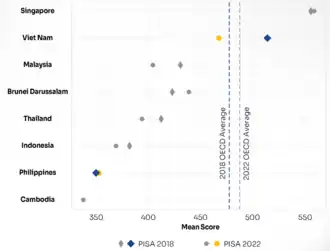
Results of international assessments
The Philippines participated in the Programme for International Student Assessment for the first time in 2018.[7] The country scored the lowest in reading comprehension and the second-lowest in mathematics and science, among 79 participating countries.[7] A report by the World Bank also found that the Philippines’ learning poverty ranks among the highest in the Asian region, at 90.9%.[8] The country fared the worst among the ASEAN countries, with the exception of Lao PDR (97.7%) and Brunei (no assessment). This means that nine in every 10 Filipinos aged 10 years old need to be taught how to read and to develop their reading comprehension.[9]
The Commission was formed as a result of these international assessments, spurred by widespread calls to reform the country's education system.[10]
Mandate and Objectives
Under Section 3 of RA 11899[11], the objectives of EDCOM II are to:
- Set specific, targeted, measurable and time-bound solutions that are products of a comprehensive assessment and evaluation, effective planning, and strategic investments in education;
- Develop a more holistic, harmonized and coordinated education ecosystem, through a review of the mandates of the three (3) agencies of education, namely: the Department of Education (DepEd), the Commission on Higher Education (CHED), and the Technical Education and Skills Development Authority (TESDA);
- Prioritize the adoption of digital transformation in education, and the use of science, technology and innovation through the promotion of digital literacy, and development of critical thinking, problem-solving and other related core competencies at par with global standards;
- Promote the development of 21st century skills, including creativity, communication, collaboration, social skills, leadership, and initiative;
- Institutionalize educational reforms necessary to meet the new challenges to education, such as the implementation of alternative learning and delivery modes for basic education, higher education and post-secondary technical-vocational education and training as part of the adjustments and responses to the global pandemic, and the advent of the Fourth Industrial Revolution characterized, among others, by digital revolution or the rapid development of information technology such as artificial intelligence, automation, data analytics, blockchain data sharing, quantum computing, and internet of things analytics; and
- Recommend the adoption and institutionalization of relevant and meaningful assessment tools, such as teaching and learning competencies assessment tools, based on the best global practices which shall be used by educational agencies and institutions for their continued monitoring, evaluation, and development.
The Commission's principal mandate is identified in Section 4:
"To undertake a comprehensive national assessment and evaluation of the performance of the Philippine education sector for the purpose of recommending transformative, concrete and targeted reforms in the sector with the end in view of making the Philippines globally competitive in both education and labor markets."[11]
Composition
The Education Commission is headed by four co-chairpersons who lead the Commission jointly - two from the Senate of the Philippines, and two from the House of Representatives.
In total, the commission has ten members, with five members from the Senate and five members from the House of Representatives.
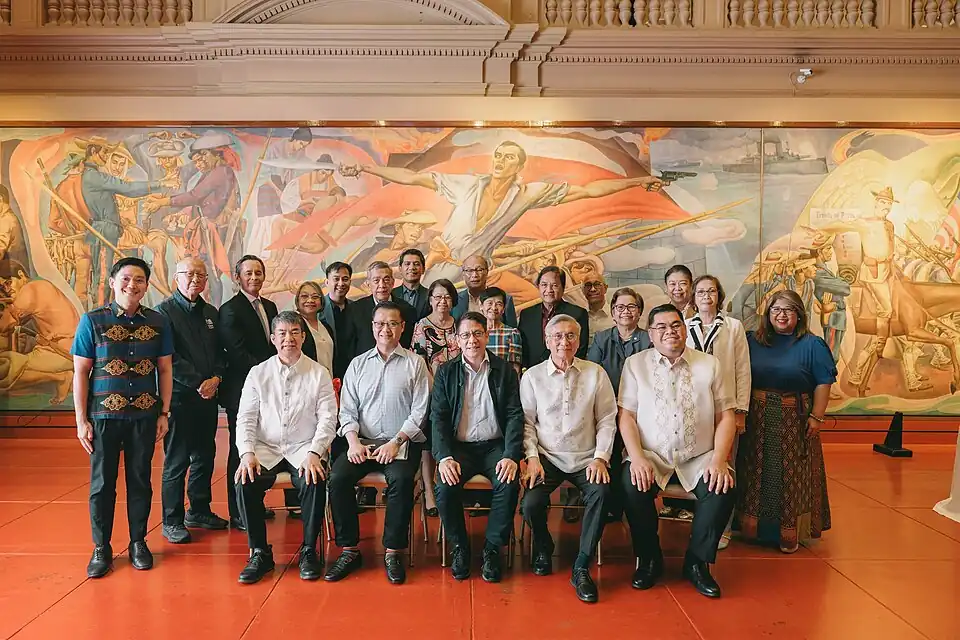
Members
The Second Congressional Commission on Education (EDCOM II) is composed of the following legislators from the 20th Congress of the Philippines:
Co-Chairpersons
- Senator Bam Aquino
- Senator Alan Peter Cayetano
- Representative Roman Romulo
- Representative Jude Acidre
Other new members of the Commission is expected to be announced once the 20th Congress of the Philippines is called into session.
Former Commissioners
- Senator Pia Cayetano, from 2023 to 2024
- Senator Koko Pimentel, from 2024 to 2025
- Senator Juan Edgardo Angara, from 2023 to 2024
- Senator Francis Joseph Escudero, from 2023 to 2025
- Representative Mark Go, from 2023 to 2025
- Representative Kiko Benitez. from 2023 to 2024
- Representative Khalid Dimaporo, from 2023 to 2025
- Representative Pablo John Garcia, from 2023 to 2025
Advisory Council
The commission is guided by an Education, Legislation and Policy Advisory Council, selected by the Senate President and the Speaker of the House of Representatives from a pool of recognized experts from the following sectors: the academe, the business sector, government education agencies, heads of LGUs, and from civil society organizations and development partners engaged in education. The members of the Council are:
- Fr. Bienvenido Nebres, S.J., Former President of Ateneo de Manila University
- Dr. Maria Cynthia Rose Bautista, Former Vice President for Academic Affairs of the University of the Philippines
- Alfredo Ayala, President of iPeople Group of Schools
- Dr. Chito Salazar, President and CEO of PHINMA Education
- Dr. Rhodora Angela Ferrer, Executive Director of PEAC
- Irene Isaac, Former Director General of TESDA
- Mayor Vico Sotto, Mayor of Pasig City
- Mayor Lani Cayetano, Mayor of Taguig City
Technical Secretariat
- Dr. Karol Mark Yee, serves as Executive Director of the EDCOM 2 Technical Secretariat
Selected Findings
| Priority Area | Selected Findings |
|---|---|
| Early Childhood Care and Development (ECCD) | The Philippines has one of the highest prevalence of l stunting under-five in the world at 26.7%, greater than the global average of 22.3%. |
| Early childhood education is not equally accessible throughout the country. Despite RA 6972 of 1990 requiring each province, city, or municipality to establish a daycare center in every barangay, only 36% have at least 1 CDC/day care, or 15,207 out of 42,027 barangays in the country. | |
| 5,800 barangays remain without a child development center | |
| Most daycare teachers and workers are aging, are not trained in early childhood education, and hold non-permanent positions with an average pay of P5,000 per month. | |
| Basic Education | Since 2012, only 27 textbooks have been procured for Grade 1 to Grade 10, despite substantial budget allocations. |
| Out of the 27 key stage assessments scheduled to be conducted from SY 2016–2017 to SY 2022–2023, 13 were delayed, and 11 were not administered at all. | |
| Learners lose as much as 42 out of 88 school days due to calamities and natural disasters | |
| The Philippines have a backlog of at least 165,000 classrooms | |
| Teacher Education | Teachers continue to bear the burden of about 50 administrative and ancillary tasks, despite efforts to allow them to focus on teaching. |
| Between 2009 and 2023, the average passing rate in the licensure examinations for elementary (33%) and secondary (40%) has been dismally low, when compared to passing rates in other professions. | |
| Enhancement of the Teacher Education Council (TEC) has been at a standstill for 2 years, despite the pressing need for necessary reforms. RA 11713, or the Excellence in Teacher Education Act was passed into law last April 27, 2022. | |
| 62% of HS teachers are handling subjects they did not major in during college | |
| There is uneven allocation of non-teaching personnel | |
| Teacher promotions occur at an alarmingly slow rate. It takes an average of 15 years to progress from Teacher I to progress from Teacher I to Teacher III. | |
| Out of 45,199 public schools, 24,916 (54%) currently do not have principals, with thousands of schools not even having plantilla items | |
| Higher Education | Most beneficiaries of the tertiary education subsidy were not the poorest. Between 2018 and 2022, the proportion of the poorest of the poor* declined markedly, from 74% to 31%. Instead, the majority of grantees were those in municipalities and cities without SUCs and LUCs (from 26% to 69%). |
| About 500,000 of the poorest high school graduates are not receiving support to attend college | |
| Technical-Vocational Education and Training (TVET) and Lifelong Learning | The majority of students are enrolled in community-based training (CBT) programs, constituting 39% of the total TVET enrollment. |
| 64% of programs with training regulations are low level (NC 1 & 2) | |
| Governance and Financing | The staffing levels in CHED and TESDA have not kept pace with the growing responsibilities of the agencies and the increased investments in education from both the public and private sectors. |
| The failure to permanently establish a high-level coordinating body has resulted in a long-standing lack of effective coordination between the education agencies. | |
| Budget allocated to education is increasing, but there is a tertiary tilt despite profound gaps in basic education | |
| There is a marked disparity in SEF income among different types of LGUs. | |
| Current levels of school MOOE budgets are insufficient to fully cover the operating costs of public elementary and high schools. |
Laws Passed
The Commission has shepherded several laws through the legislative process, namely:
| Republic Act No. | Name of the Law | Short Title | Date of Passage into Law |
|---|---|---|---|
| 12199 | AN ACT FURTHER STRENGTHENING THE EARLY CHILDHOOD CARE AND DEVELOPMENT SYSTEM, REPEALING FOR THE PURPOSE REPUBLIC ACT NO. 10410, OTHERWISE KNOWNAS THE “EARLYYEARS ACT (EYA) OF 2013”, AND APPROPRIATING FUNDS THEREFOR | Early Childhood Care and Development System Act | May 8, 2025 |
| 12080 | AN ACT STRENGTHENING THE PROMOTIONAND DELIVERY OF MENTAL HEALTH SERVICES IN BASIC EDUCATION BY DEVELOPING SCHOOL-BASED MENTAL HEALTH PROGRAMS, ESTABLISHING SCHOOLS DIVISION MENTAL HEALTH AND WELL-BEING OFFICES AND CARE CENTERS, PRESCRIBING THE CREATION OF NEW PLANTILLA POSITIONS, AND HIRING AND DEPLOYING SCHOOLS DIVISION COUNSELORS, SCHOOL COUNSELORS, AND SCHOOL COUNSELOR ASSOCIATES IN THE DEPARTMENT OF EDUCATION, AND APPROPRIATING FUNDS THEREFOR | Basic Education Mental Health and Well-Being Promotion Act | December 6, 2024 |
| 12063 | AN ACT INSTITUTIONALIZING THE ENTERPRISE-BASED EDUCATION AND TRAINING FRAMEWORK AND APPROPRIATING FUNDS THEREFOR | Enterprise-Based Education and Training (EBET) Framework Act | November 7, 2024 |
| 12028 | AN ACT ESTABLISHING AN ACADEMIC RECOVERY AND ACCESSIBLE LEARNING (ARAL) PROGRAM AND APPROPRIATING FUNDS THEREFOR | Academic Recovery and Accessible Learning (ARAL) Program Act | October 16, 2024 |
| 12027 | AN ACT DISCONTINUING THE USE OF THE MOTHER TONGUE AS MEDIUM OF INSTRUCTION FROM KINDERGARTEN TO GRADE 3, PROVIDING FOR ITS OPTIONAL IMPLEMENTATION IN MONOLINGUAL CLASSES, AND AMENDING FOR THE PURPOSE SECTIONS 4 AND 5 OF REPUBLIC ACT NO. 10533, OTHERWISE KNOWN AS THE "ENHANCED BASIC EDUCATION ACT OF 2013" | October 10, 2024 | |
| 11984 | AN ACT MANDATING PUBLIC AND PRIVATE EDUCATIONAL INSTITUTIONS TO ALLOW DISADVANTAGED STUDENTS WITH UNPAID TUITION AND OTHER SCHOOL FEES TO TAKE THE PERIODIC AND FINAL EXAMINATIONS AND FOR OTHER PURPOSES | No Permit, No Exam Prohibition Act | March 11, 2024 |
Policy Advocacy
Aside from legislation, the Commission has also successfully advocated for policy changes and implementation in the executive branch:
| Priority Area | Description |
|---|---|
| Early Childhood Care and Development (ECCD) | Recommendation of the NEDA Social Development Committee to include nutrition in the early years in the Legislative Executive Development Advisory Council (LEDAC) Agenda. |
| Inclusion of the First 1,000 Days and nutrition-related funding in the early years under DBM’s Program Convergence Budgeting for FY 2026. | |
| Increase in cost per capita of DSWD’s Supplementary Feeding Program in the 2025 National Expenditure Plan from Php 15 per hot meal to Php 27 per hot meal. | |
| Quadruple increase of DOH’s nutrition budget in the 2025 GAA from Php 235 million to Php 977 million. | |
| TESDA Board approval for the prioritization of Child Development Workers Training Regulations (TR) development to create an NC III in ECCD on November 13, 2024. | |
| Conducted a meeting with DILG to include ECCD indicators as part of the Seal of Good Local Governance (SGLG) | |
| Basic Education | Issuance of DepEd Memorandum No. 049 s.2024 that mandates Early Procurement Activities to expedite processes and budget utilization for DepEd projects, including the procurement of textbooks, modules, activity sheets, and teacher’s manuals |
| Commissioned a study on procurement in basic education to facilitate further reforms in textbook provision. | |
| Conducted a review of the previous 2019 Functional Literacy, Education and Mass Media Survey (FLEMMS) questionnaire, and submitted proposed revisions to the FLEMMS to include additional profiling questions, and to share inputs on improving the instrument for assessing functional literacy | |
| Conducted teacher consultations on the MATATAG curriculum and submitted the inputs to DepEd | |
| Conducted a Workshop on Legislated Subjects and Activities in Basic Education and Higher Education with DepEd, CHED, TESDA, teacher representatives and submitted inputs to the agencies | |
| Conducted consultations and school visits to Quezon City Science High School, Philippine Science High School - Main Campus, and the University of the Philippines - National Institute for Science and Mathematics Education Development on special curricular programs for science, technology, and mathematics | |
| Higher Education | CHED has fast-tracked the reconstitution of Technical Panels, from only 15 in 2023 to an additional 72 in 2024, leaving only 18 more panels to be reconstituted |
| GAA 2024 special provision on TES prioritization of the poorest, and the subsequent increase in the share of the 4Ps/Poorest grantees | |
| Conducted harmonization workshops as part of ongoing study on empirical-based clustering of characteristics of HEIs as foundation of the proposed typologies | |
| Provided inputs on internationalization of higher education and participated in the deliberations on Resolution of Both Houses No. 7 and Senate Resolution of Both Houses No. 6 | |
| In partnership with USAID UPSKILL, EDCOM participated in an Executive Benchmarking Mission to the US with focus on higher education and governance and finance | |
| Teacher Education | The Teacher Education Council has begun its full operationalization consistent with RA 11713, beginning with the appointment of its Executive Director last September 6, 2024 |
| Issuance of CHED Memorandum Order 10 s. 2024, which empowers CHED to impose sanctions, such as program termination and institutional closure, based on a TEI’s performance | |
| Convened a Technical Working Group on DepEd Hiring and Teacher Ancillary and Administrative Tasks | |
| Technical-Vocational Education and Training (TVET) | Conducted hearing with DEPED, CHED, TESDA, DOLE, and PSA on LMI processes in the Philippines (PA 19) with PIDS Presentation |
| Funding of Php 10 million for the development of a generative Artificial Intelligence (AI)-powered labor market researcher in the GAA of 2025 | |
| Funding of Php 40 million for the acquisition/development of Artificial Intelligence (AI)-powered TVET course builder for Philippine TVET in the GAA of 2025 | |
| Governance and Finance | Conducted consultations and documented national government efforts to establish coordinative mechanisms for the education sector, which led to the identification of key challenges hindering the permanent establishment of a high-level coordinating body recommended by EDCOM I. This became the basis for drafting the Concurrent Resolution on the Creation of a Cabinet Cluster for Education currently approved in principle by the President |
| Conducted a workshop on complementarity with Mr. Harry Patrinos, an expert resource person from the World Bank Headquarters, to develop a common understanding of complementarity in the Philippines and explore various models and possible directions for the education sector covering ECCD, basic education, TVET, and higher education | |
| Commissioned E-CAIR to generate insights on excess enrollment that can be decongested from public schools vis a vis absorptive capacity of private education | |
| Finalized a research report on strengthening performance and accountability systems in the Philippine education system based on desk review, workshops and consultation activities, through technical support from USAID ILO-PH |
Publications and Outputs
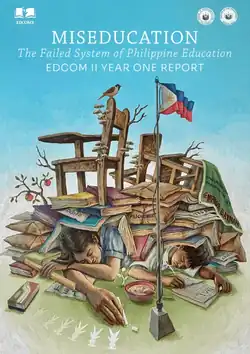
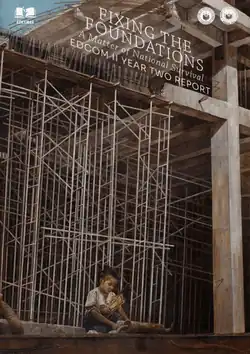
Year One Report
On January 23, 2024, the commission published its Year One Report, entitled Miseducation: The Failed System of Philippine Education. The report highlighted the commission's findings in twelve out of its twenty-eight Priority Areas, following its first year of work.[12]
The report also contained 40 recommendations that target specific objectives by the commission.
Year Two Report
The Commission followed up its first report with its Year Two Report, entitled Fixing the Foundations: A Matter of National Survival, on January 27, 2025. In the report, the Commission advocated for addressing "foundational learning deficits in early childhood and primary education".[13][14]
Among the findings that EDCOM II highlighted are the shortage of principals in more than half of public schools in the country,[15] that most Grade 3 students were one to two years behind curriculum expectations during the foundational years of learning,[16] government support to only 1.03% of the best and brightest students in the country,[17] the dismal attrition rate in higher education institutions,[18] that 62% of high school teachers teach subjects outside their college major,[19] and that Philippine government spending on education still fails to keep pace with global standards,[20] with basic education receiving the lowest share in the budget, despite its foundational role.
Final Report (Upcoming)
The Commission is set to launch its final report in the Fourth Quarter of 2025.[21] This is in line with RA 11899's mandate to "report to Congress its accomplishments on a periodic basis, its findings and recommendations on actions to be taken by Congress, the departments, and other government agencies concerned with education, and provide a final report at the end of the existence of the Commission."[22]
Other Publications
- Education Roadmap - Section 7 also mandates that the Commission's Final Report must "include a roadmap with clear key performance indicators and results framework to address the learning crisis". This is set to be included in the Final Report.
- National Education and Workforce Development Plan - During a January 2025 meeting with President Bongbong Marcos, he instructed the Commission to proceed with the development of a National Education and Workforce Development Plan (NatPlan), a strategic initiative to align the nation’s education system and workforce with the rapidly evolving demands of a global economy.[23] The initiative is being co-developed with the Private Sector Advisory Council.[23] This is to be included in the Commission's Final Report.
Partners and Stakeholders
EDCOM 2 has partnered extensively with academic institutions, civil society organizations, diplomatic missions, and government organizations to fulfill its mandate.[24] Select partners include:
- Ateneo de Manila University
- Australian Aid
- Asian Institute of Management
- BARMM Ministry of Basic, Higher and Technical Education
- British Council
- Commission on Higher Education
- De La Salle-College of Saint Benilde
- De La Salle University-Dasmariñas
- Department of Education
- De La Salle University
- Education Development Center
- IDinsight
- Innovations for Poverty Action
- Jose Rizal University
- Metrobank Foundation
- Philippine Business for Education
- Private Education Assistance Committee
- Philippine Institute for Development Studies
- Research Institute for Teacher Quality
- The Asia Foundation
- Teach for the Philippines
- Technical Education and Skills Development Authority
- UNFPA
- UNICEF
- University of the Philippines Los Baños
- University of the Philippines System
- USAID
- WeSolve Foundation
Commissioned Studies
The Commission's partnerships have produced several studies devoted to education.
Impact
The Commission's work has been impactful in the Philippines' education reform landscape. The British Council commended the Commission's Year Two Report, "We commend the EDCOM II Year 2 report for its comprehensive analysis and recommendations, which affirm the momentum of our work in higher education and science. The report highlights the increasing collaborations between foreign institutions and the Philippines, aligning with our shared goal of strengthening the country’s higher education and research ecosystem". [25]
The University of the Philippines Los Baños has also expressed appreciation, saying "We, at UPLB, extend our deepest appreciation to the Second Congressional Commission on Education II (EDCOM 2) for its comprehensive assessment and actionable recommendations as outlined in the Year Two Report, Fixing the Foundations: A Matter of National Survival. This report underscores the fundamental role of early childhood education and nutrition interventions in strengthening the foundational stages of learning. Drawing upon the growing body of evidence, the report sets out a roadmap on what needs to be done in terms of capacitating and empowering our teaching and non-teaching personnel, improving access to higher education, increasing industry participation in technical and vocational education and training and lifelong learning, among others, and how to do it."[26]
The Ateneo de Manila University also lent its commendation to the Commission, saying, "Ateneo remains committed to collaborating with policymakers, educators, and stakeholders in implementing these much-needed reforms. We look forward to further engagements with EDCOM 2 in research, policy advocacy, and capacity-building initiatives that align with our shared vision for a stronger Philippine education system"[27]
Gallery
References
![]() This article incorporates text from this source, which is in the public domain: "Miseducation: The Failed System of Philippine Education. EDCOM II One Year Report" (PDF). Second Congressional Commission on Education. 2024. Retrieved 6 August 2025.
This article incorporates text from this source, which is in the public domain: "Miseducation: The Failed System of Philippine Education. EDCOM II One Year Report" (PDF). Second Congressional Commission on Education. 2024. Retrieved 6 August 2025.
- ^ "[WATCH] In The Public Square with John Nery: Is EdCom II the answer?". RAPPLER. 2023-02-22. Retrieved 2023-03-16.
- ^ "The Second Congressional Commission on Education". EDCOM 2. Retrieved 2023-03-16.
- ^ Chi, Cristina. "Bill creating EDCOM II lapses into law". Philstar.com. Retrieved 2023-03-16.
- ^ "EDCOM 2 to conduct full assessment of PH education system in next 3 years—Angara". Manila Bulletin. Retrieved 2023-03-16.
- ^ Magsambol, Bonz (2025-01-28). "Rappler Talk: 'Fixing the foundations' of an education system in crisis". RAPPLER. Retrieved 2025-07-16.
- ^ a b Cynthia, Ma & Bautista, Rose & Bernardo, Allan & Ocampo, Dina Joana. (2010). When Reforms Don't Transform: Reflections on institutional reforms in the Department of Education.
- ^ a b Juan, Ratziel San. "DepEd welcomes PISA results, recognizes 'gaps' in education quality". Philstar.com. Retrieved 2025-07-16.
- ^ Vera, Ben O. de (2022-07-23). "WB: PH 'learning poverty' among highest in region". INQUIRER.net. Retrieved 2025-07-16.
- ^ "The cost of illiteracy: Why the education system in Philippines is failing millions". DevelopmentAid. Retrieved 2025-07-16.
- ^ Hernando-Malipot, Merlina (December 6, 2023). "2022 PISA results a 'clear indication' that PH education system is in 'worst state' --- PBEd".
- ^ a b "Republic Act No. 11899". lawphil.net. Retrieved 2025-08-05.
 This article incorporates text from this source, which is in the public domain.
This article incorporates text from this source, which is in the public domain.
- ^ "Edcom 2 releases Year One report". The Manila Times. 2024-01-31. Retrieved 2024-02-13.
- ^ "PBBM to DepEd, EDCOM II: Work together to address gaps". SunStar Publishing Inc. 2025-02-04. Retrieved 2025-02-18.
- ^ "Fixing the Foundations: A Matter of National Survival". EDCOM 2 Year Two Report. January 27, 2025. ISSN 3027-9976.
- ^ Reyes, Dempsey (2025-01-28). "Edcom: Almost 25,000 public schools have no principals". inquirer.net. Retrieved 2025-02-18.
- ^ "Latest EDCOM 2 Report calls for systemic change in Philippine education". IDinsight. Retrieved 2025-02-18.
- ^ Serquiña, Mariel Celine (2025-01-28). "Half of Pisay passers unable to enroll due to limited slots". GMA News Online. Retrieved 2025-02-18.
- ^ "Higher College Enrollment but Still High Dropout Rate in College Since Free Tuition Law". phkule.org. 2025-02-14. Retrieved 2025-02-18.
- ^ Chi, Cristina. "62% of high school teachers teaching outside their field, new report reveals". Philstar.com. Retrieved 2025-02-18.
- ^ Magsambol, Bonz (2025-02-04). "Decades on, Philippines' education spending still not enough". RAPPLER. Retrieved 2025-02-18.
- ^ "EDCOM 2 - The EDCOM 2 Final Report". EDCOM 2. Retrieved 2025-07-16.
- ^ "Republic Act No. 11899". lawphil.net. Retrieved 2025-07-16.
- ^ a b "Marcos wants gov't to develop semiconductor industry". www.pna.gov.ph. Retrieved 2025-07-16.
- ^ "Partners". EDCOM 2. Retrieved 2025-07-16.
- ^ "British Council Statement of Support for EDCOM II".
- ^ Araguas, Kristine (2025-02-13). "Statement of Support for the EDCOM 2 Year Two Report". UPLB. Retrieved 2025-08-15.
- ^ "Ateneo de Manila University supports EDCOM 2's Year 2 Report recommendations".




